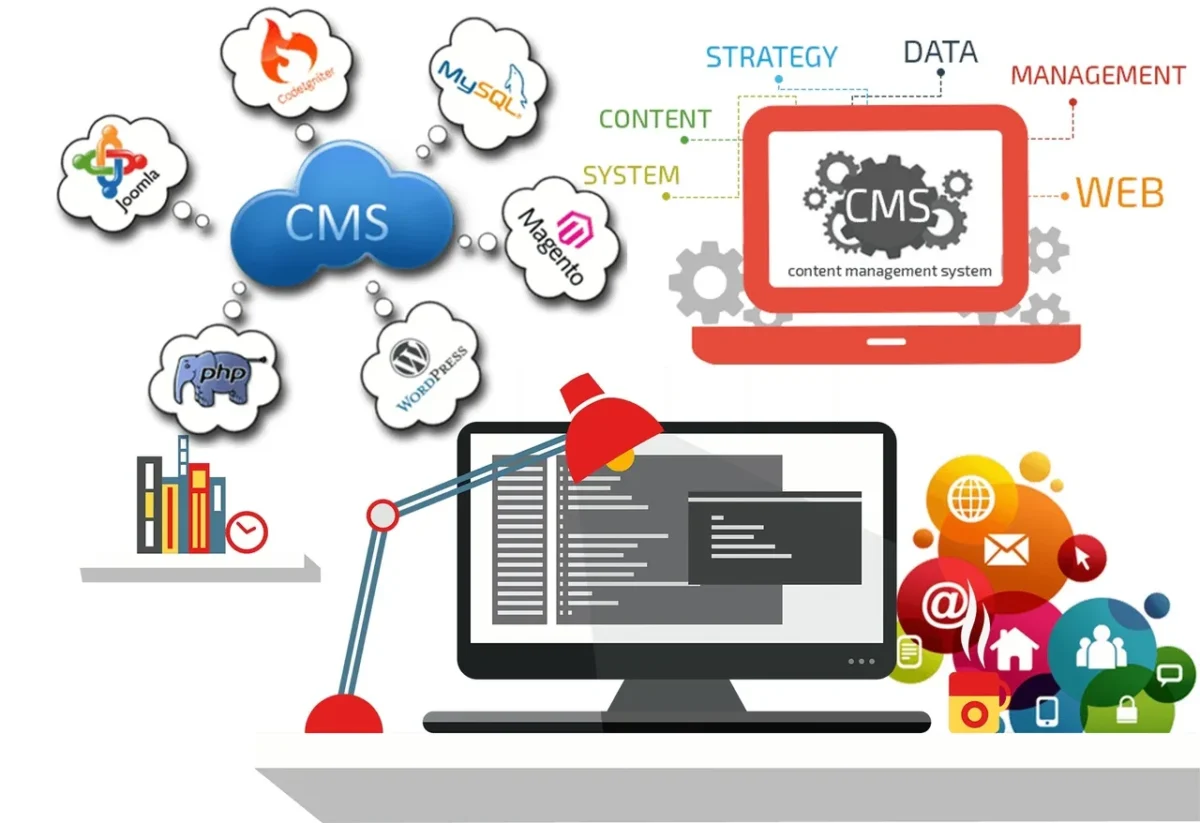Content management systems (CMS) are at the heart of today’s digital businesses. From marketing websites to e-commerce stores and enterprise portals, CMS platforms enable organizations to create, store, and distribute digital content. Many companies rely on off-the-shelf solutions like WordPress, Drupal, or Shopify because they are quick to deploy and relatively cost-effective.
However, as businesses scale and digital demands grow more complex, these prebuilt systems often show their limitations. Teams encounter challenges around flexibility, scalability, security, and integration. To stay competitive, many organizations are making a stronger case for custom CMS development and tailoring a platform that fits their unique business processes rather than forcing their workflows to adapt to rigid tools.
This article explores why custom CMS development is increasingly seen as a long-term investment rather than a cost, and how it enables organizations to scale digital operations effectively.
Limitations of Off-the-Shelf CMS
Off-the-shelf CMS platforms are convenient and widely available, but they come with several constraints that limit their effectiveness in large or fast-growing organizations. A Web Development Agency often encounters clients struggling with these very issues when they outgrow their starter platforms.
One of the biggest challenges is flexibility. Many prebuilt CMS platforms are designed with a wide audience in mind. This means they come with features that may not align with your specific business needs. Teams often find themselves using only a fraction of the features available while relying on additional plugins or workarounds to fill the gaps.
Another limitation is hidden costs. While these CMS tools may appear affordable at first, the reliance on third-party plugins, frequent upgrades, and security patches can quickly drive expenses upward. Maintenance becomes unpredictable, and organizations risk downtime when updates break critical functions.
Security is another concern. Off-the-shelf systems often rely on shared frameworks and widely available plugins, which can be targeted by hackers. For industries like healthcare, finance, or legal services, where compliance is non-negotiable, this level of exposure is unacceptable.
Finally, scalability is an issue. As organizations expand to new markets or channels, prebuilt CMS platforms often struggle to keep up. They are not designed to handle complex integrations or heavy enterprise traffic, creating bottlenecks that impact both operations and customer experience.
What Is Custom CMS Development?
Custom CMS development refers to building a content management system tailored specifically to an organization’s workflows, goals, and growth strategy. Unlike off-the-shelf systems, which aim to satisfy a broad set of users, custom CMS platforms are designed to meet the precise requirements of a business.
These platforms can be developed from scratch or by extending existing frameworks. The key is customization, building the right tools to support publishing workflows, content governance, integrations with other enterprise systems, and future scalability.
For instance, a global e-commerce brand may require a CMS that integrates with its ERP, CRM, and supply chain management tools, while a media company might prioritize high-performance publishing at scale with editorial workflows. In both cases, a custom CMS offers the flexibility and control required to meet those needs.
Advantages of a Custom CMS
Tailored Features for Specific Needs
Every business has unique workflows and requirements. A custom CMS ensures that teams don’t have to compromise or rely on makeshift solutions. Instead of paying for features that remain unused, organizations can invest in capabilities that directly support their goals, such as multi-language publishing, custom approval workflows, or integration with niche platforms.
Enhanced Security and Compliance
Security is a growing concern across industries. Custom CMS platforms allow businesses to design security features from the ground up, with controls tailored to their compliance requirements. For example, a healthcare provider can implement HIPAA-compliant data storage, while a financial institution can ensure encrypted transaction workflows. With a custom approach, businesses reduce reliance on vulnerable third-party plugins and gain peace of mind knowing their platform is designed with security as a priority.
Improved Performance and Scalability
Custom CMS platforms are built to handle the exact performance needs of the organization. Unlike off-the-shelf platforms that may struggle under enterprise traffic, a custom CMS can be designed to scale horizontally and vertically, ensuring consistent uptime even during peak demand. This scalability is essential for businesses planning to expand globally or deliver content across multiple channels.
Long-Term Cost Efficiency
While custom CMS development involves a higher upfront investment, it can often lead to long-term savings. Businesses avoid recurring licensing fees, costly plugin purchases, and unpredictable maintenance expenses. Moreover, by aligning the CMS closely with business objectives, organizations eliminate inefficiencies and reduce the hidden costs of working around inflexible platforms.
Business Case to Stakeholders
ROI Considerations
One of the most compelling arguments for a custom CMS is return on investment. While the upfront costs are higher, the long-term benefits outweigh them. Businesses save time on inefficient processes, reduce reliance on third-party vendors, and maximize the value of every piece of content created.
Competitive Advantage
A custom CMS allows businesses to differentiate themselves. Instead of being constrained by the limitations of generic platforms, organizations can deliver unique digital experiences. Whether it’s personalized customer journeys, advanced analytics, or seamless omnichannel publishing, a custom CMS supports innovation and competitive growth.
Strategic Alignment
Digital transformation is no longer optional; it’s essential for long-term success. A custom CMS aligns closely with digital transformation strategies by integrating seamlessly with existing enterprise tools like CRM, ERP, or marketing automation platforms. This ensures that the CMS doesn’t stand alone but functions as part of a cohesive, future-ready digital ecosystem.
Challenges to Consider Before Investing
While the benefits are substantial, businesses must also understand the challenges of custom CMS development.
- Upfront Costs: Building a custom CMS requires significant investment, particularly in the planning and development stages.
- Longer Timelines: Developing from scratch or heavily customizing requires time. Organizations must plan for extended project cycles.
- Skilled Partners: Success depends on the expertise of the development team. Choosing the wrong partner can result in delays and inefficiencies.
- Ongoing Maintenance: Post-launch support is critical. A custom CMS is not a “set and forget” system; it requires ongoing optimization.
By preparing for these challenges, businesses can set realistic expectations and maximize the success of their investment.
Best Practices for Successful Custom CMS Development
Conduct a Thorough Needs Analysis
Start with a comprehensive review of workflows, content processes, and integration requirements. The goal is to understand what the CMS must achieve before development begins.
Collaborate with Stakeholders
CMS systems impact marketing, IT, operations, compliance, and more. Involving all relevant stakeholders ensures that no requirements are overlooked and that the final system delivers value to the entire organization.
Partner with Experienced Developers
The success of a custom CMS depends heavily on the expertise of the team building it. Partnering with experienced developers ensures that the platform is designed with scalability, performance, and integration in mind.
Plan for Scalability and Integration from the Start
Future-proofing is critical. Even if current needs are modest, businesses should design their CMS to handle future growth, additional integrations, and expanding digital channels.
Real-World Examples
Global Enterprises
A multinational retail company consolidated multiple regional CMS platforms into a single, custom-built system. The move improved brand consistency, reduced duplication, and allowed the company to roll out campaigns globally with greater speed.
Media Organizations
A large media outlet invested in a custom CMS to handle its high-volume publishing needs. The platform was optimized for speed, editorial workflows, and multimedia content, resulting in better user engagement and ad revenue.
Healthcare Providers
Hospitals developed custom CMS platforms that complied with industry regulations while ensuring secure access to patient education materials. The system reduced errors, improved trust, and allowed for easy updates as new medical guidelines emerged.
Conclusion
Investing in a custom CMS is not about rejecting popular off-the-shelf platforms; it’s about recognizing when they no longer meet business needs. For organizations looking to scale, secure their data, and create unique digital experiences, a custom CMS provides the flexibility and long-term value necessary to thrive in a competitive market.
By carefully weighing the challenges, aligning the system with business goals, and working with experienced partners, companies can ensure their CMS becomes more than just a publishing tool. It becomes the backbone of their digital strategy, driving efficiency, innovation, and sustainable growth.

